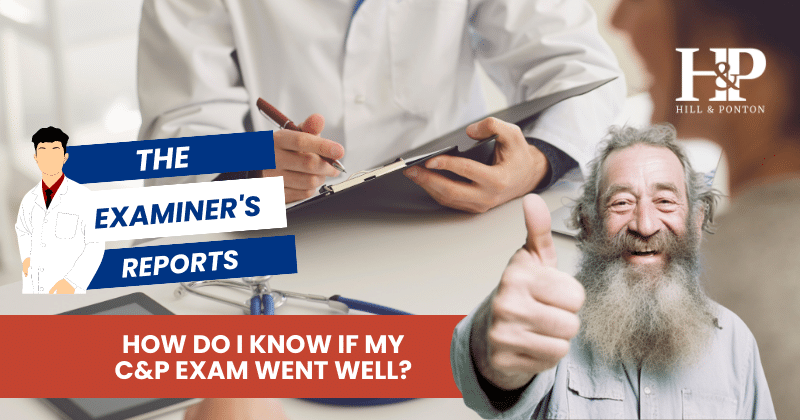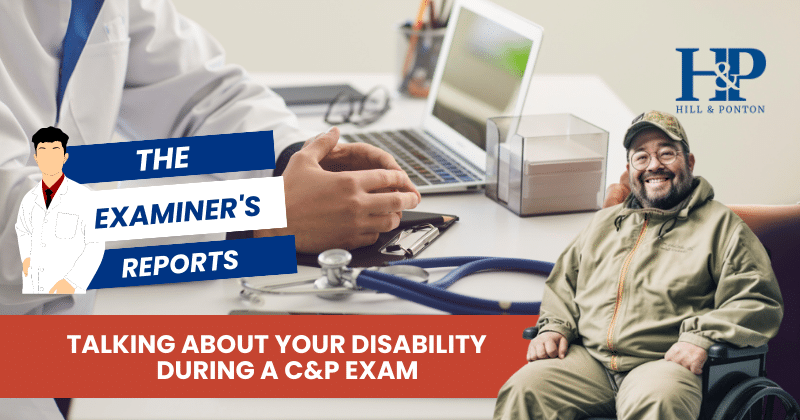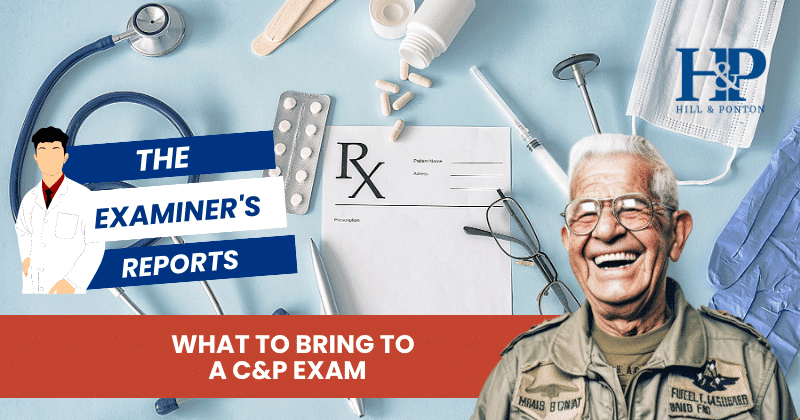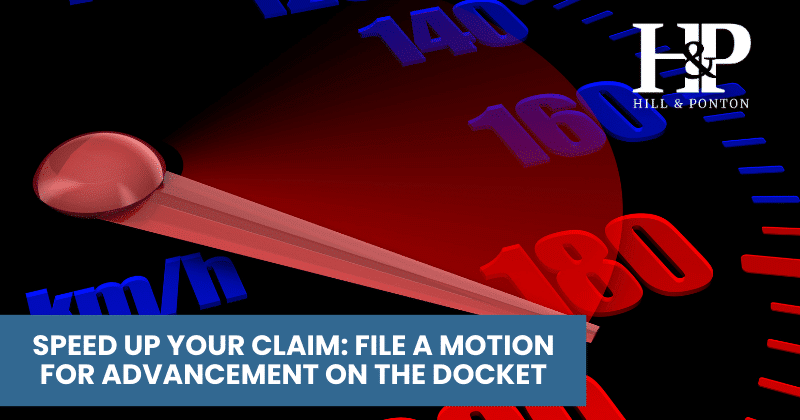
If you were to ask the VA, they would tell you that you don’t need to bring anything to a VA disability exam (also known as a Compensation and Pension – or C&P – exam).
While it is technically true that showing up empty-handed won’t impact your VA disability claims from moving forward in the system, it doesn’t mean that you’ll be best prepared to fight for your case.
At Hill and Ponton, we want to arm you with everything you could possibly need to be successful in establishing a service connected disability.
I’ve been a C&P examiner for the past several years, and I have seen too many patients show up missing the critical info that would make supporting their claim much easier. Before we get to the actual list, it might help to look at all of this from a specific angle, which is to…
Consider the VA disability claim from your examiner’s perspective!
When you are being interviewed by a C&P doctor, they are focused on two categories of information: subjective and objective.
- Subjective information includes your symptoms, description of your condition, and the impact it has on your life.
- Objective information has more to do with things you can directly measure free from bias, like a blood pressure, your lumbar range of motion, or renal function on recent diagnostic labs. The VA requests as much objective information as possible in an exam report.
Subjective information is important since it helps the doctor understand the overall narrative regarding your disability, but most claims cannot stand on subjective data alone.
So when your examiner is able to see objective measures relevant to your disability, this goes a long way in propping up the necessary medical evidence. With this in mind, you’ll begin to see why bringing the following items to your VA claim exam can help:
1. Relevant Medical Records
“Bring medical records to an exam? Why? I submitted all of those already!”
The VA’s official guidance on this topic is that all of the medical records relevant to your disability should be submitted via one of several, formal channels (which should absolutely be done).
Because of this recommendation, they maintain that you don’t need to bring any records in-person to your exam, since the doctor should have access (in the C-File) to everything you’ve submitted.
In an ideal world, this would always work out. But consider for a moment how these records are processed – they may end up passing through multiple hands, softwares, and workflows to actually end up at your examiner’s desk.
This takes time, and in some cases, the records you’ve submitted might not make it to the C-File in time for your exam.

Think about all the different clinics, hospitals, or centers where you’ve been treated for your disability and compile a hard-copy folder of all the relevant records to bring with you to your exam.
And even if you get to the exam and find that all the records are, in fact, already available in the CFile, your provider being able to see them compiled all in one place will make it easier for them to analyze, which in turn makes it easier to support a positive connection to military service.
2. Hand-Selected Service Treatment Records
Service Treatment Records are documents that show everything you were treated for while you were in military service. Unfortunately, there tend to be a few problems with these records:
- Many of these records (especially the older ones) are handwritten and can be difficult to read through.
- Many of these records can be quite old and deteriorated, further making it difficult to understand them.
Your examiner typically looks through documents by using a search function. As you can imagine, the reasons above make it impossible to use that feature, which leads to sometimes having to comb through hundreds (sometimes thousands…!) of pages manually.
As you can imagine, that may make it harder for them to find the info that’s relevant to your disability.
You obviously may be more motivated to find this information than they are, so to mitigate these difficulties, you can obtain a copy of your military records and comb through them yourself. Highlight any information that is relevant to your disability and have it on hand to show your examiner during your exam.
3. A Current Medication List
You’d be correct for thinking that your most current list of medications should be listed in your claim file (aka C-File) – this is the prevailing presumption in most of the veterans I see.
However, it may help to know that the C-File is not a live document or charting system like your VA doctor has access to, but rather a compilation of records that cuts off after a certain date.
Because of this, if your last documented appointment was a year ago (with current medications documented at that time), that list may no longer be up to date or accurate.

Often, patients with multiple illnesses aren’t fully aware of the finer details related to their diagnoses. However, the specifics of these your medical condition really matter for establishing VA benefits, and considering the fact that your examiner is applying forensic skills to dive into your case, seeing your medication list can really help them understand the full scope of what disabilities you suffer from.
Here’s some examples of how they do this:
- You may know that you have some level of cardiac disease, but if you’re currently on a beta blocker, your examiner might suspect ischemic heart disease.
- If you’re on a blood thinner, they may suspect a history of atrial fibrillation.
- If you’re taking several, specific drugs used in a certain combination, your examiner might look for further information on whether or not you have heart failure.
4. Claim-Relevant Forms
This is usually the exception rather than the rule, but sometimes the VA requests specific forms to complete your exam.
One common example is a hypertension log, which is used to document your blood pressure over several days. Specifically, the VA is looking for hypertension readings taken twice a day on three different days.
Another example that is not required, but tends to be helpful is a Disability Benefits Questionnaire completed by your physician, which is the same exam report that is going to be completed by your examiner. Your examiner seeing the same information about your VA disability claim supported by another provider’s documentation could go a long way.
(For a full list of all DBQ’s made available by the VA, see our comprehensive list here!)
If you are, in fact, required to complete a form so that your exam report can be completed, this should be documented in the appointment paperwork you receive prior to your examination (though please note this may not always arrive in time before your appointment).
5. Your Assistive Devices
Assistive devices are another important objective piece of evidence. Whether they are prescribed or over-the-counter, these devices will help your examiner more accurately understand the nature and extent of your VA disability claim.
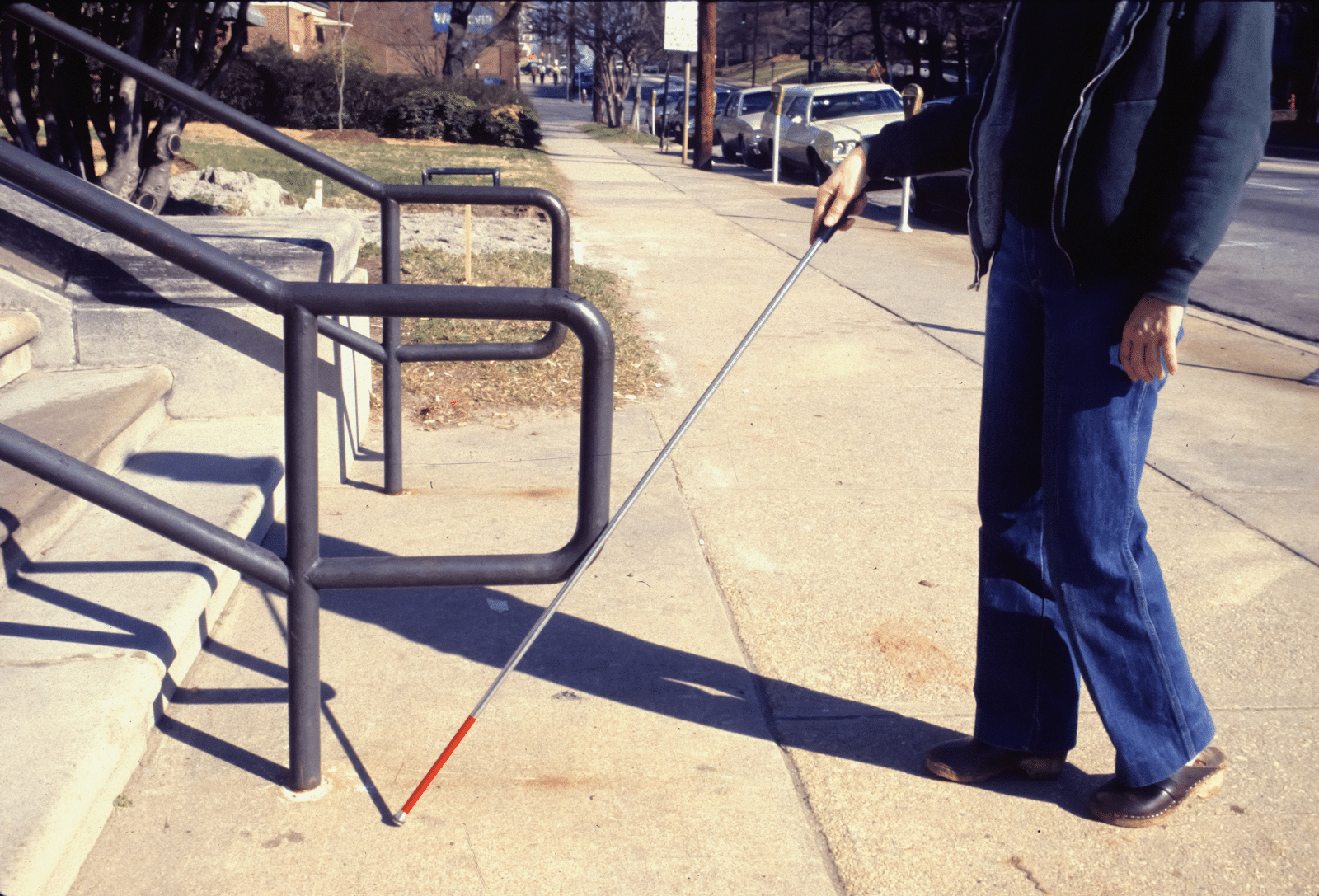
Not only that, but it may help your examiner uncover important collateral information. For example, the presence of a knee brace may help the examiner document on instability, which is an important variable that has an impact on your rating.
Further, if your assistive device is critical for everyday movement, you may not be able to complete the C&P exam without it! For example, if your condition affects your ability to walk, you may need a wheelchair to get to and from the exam room. If your disability affects your hearing, you may need a hearing aid to be able to hear the examiner’s questions.
6. Research Articles Supporting your Nexus
Sometimes, the connection between your disability claims and service is more subtle than might immediately be evident to your examiner. This is best described through a few examples:
- Sleep Apnea and PTSD: Many examiners might quickly dismiss this secondary relationship, reasoning that obstructive sleep apnea is an airway problem without a psychogenic origin. However, you may be able to show that PTSD caused you to gain weight, which served as an “intermediate step” in your development of sleep apnea.
- Joint Arthritis and GERD: Again, the relationship between arthritis in one of your joints and the GERD you suffer from may not be immediately apparent. However, patients with arthritis sometimes take large amounts of over-the-counter pain relief pills like anti-inflammatories to control their pain, which are known to cause alterations in stomach lining and can cause things like ulcers.
Finding research articles that help support these relationships may help sway your provider’s opinion, especially when it comes to secondary relationships that may be more subtle or indirect.
Spend some time doing research on your disability claims, find some relevant evidence-based studies, and highlight important excerpts to make this as straightforward as possible for your examiner.

7. A Spouse, Partner, or Close Family Member
Bringing someone who is close to you (typically a family member) to your disability examination can help you fill in details as you’re being interviewed that you may miss along the way.
The information they give during your interview will also be considered subjective, but it certainly helps to have multiple people confirming the status of your disability claim and its impact on your everyday life. Layman evidence like this is required to be considered by your examiner as a part of their overall deliberation for your claim exam.
Preparing for your VA Claim Exam is one of the best ways to secure disability benefits.
At the end of the day, one of the most important things that determines the outcome of your disability claim is your VA disability examination (aka C&P exam). Being as prepared as possible for this encounter with your examiner means understanding how they think and what type of information they are looking for. Don’t wait until you get a negative decision letter – before your next C&P exam, make sure you bring as much ammunition as you can to the table!

